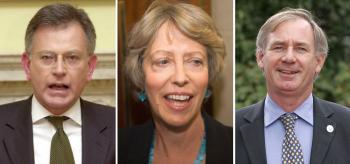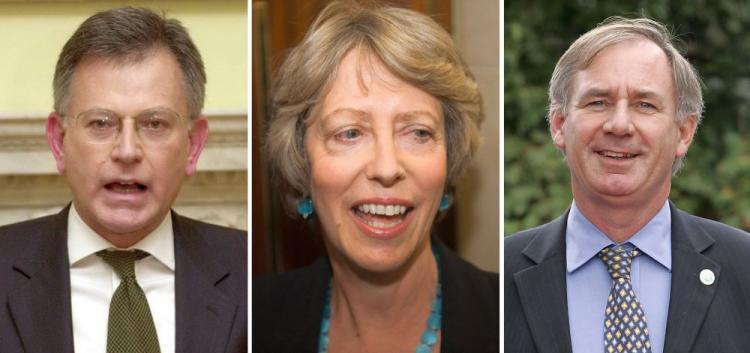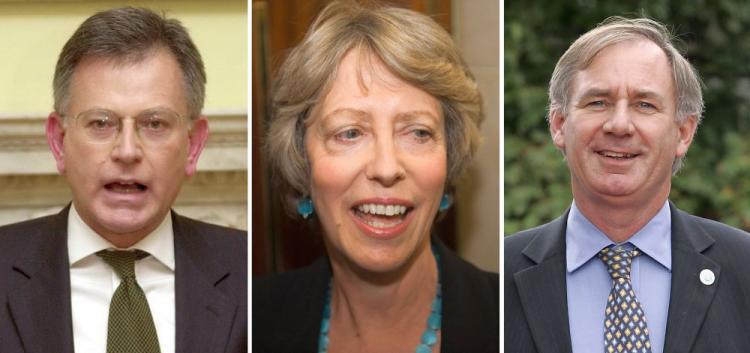LONDON—Three former British ministers have been suspended from the ruling Labor Party after being caught on tape offering their lobbying services for cash.
The ex-ministers were secretly filmed as part of an undercover television investigation, in which they were being asked by a fictitious U.S. lobbying firm for their help.
Former British Transport Secretary Stephen Byers said in the video he was like a “cab for hire” offering his lobbying services for up to $7,500 a day. He told the undercover reporter that he had previously made deals with ministers, was able to get confidential data from the Prime Minister’s Office, and could help large firms to get around the law.
Byers made specific reference to transport company National Express and supermarket chain Tesco. He claimed to have saved millions of pounds for National Express who wanted to get out of its East Coast mainline franchise.
National Express denies having paid the MP and says that he was one of many MPs who they had contacted because the affected rail line went through their constituencies.
Transport Secretary Lord Adonis said there was no secret deal over a National Express rail franchise and Mr. Byers’ assertion was “pure fantasy.”
Byers now says he had been exaggerating his influence over government policy and had “never lobbied ministers on behalf of commercial interests.”
Byers has referred himself to the Parliamentary Standards Commissioner John Lyon. “I am confident that he [John Lyon] will confirm that I have complied with the MP’s code of conduct and have fully disclosed my outside interests,” Byers said.
Other former ministers and MPs were also approached by The Sunday Times and Channel 4’s Dispatches as part of an investigation into parliamentarians’ lobbying and advice work.
Geoff Hoon, a former British Defense ecretary was filmed saying, “One of the challenges I am looking forward to is translating my knowledge and contacts on the international scene into something that, frankly, makes money.”
Following the broadcast, Hoon said he would not “attempt to sell confidential or privileged information arising from my time in government.” He said his unpaid work with NATO, on the prime minister’s behalf, would now cease.
Patricia Hewitt, a former health secretary, said she “completely rejected” the suggestion she helped obtain a key seat on a government advisory group for a client paying her $4,500 a day.
All three deny dishonest behavior.
There is general concern from all parties about lobbying and advisory work by ex-ministers and MPs. Labor, the Tories, and the Liberal Democrats say the rules should be tightened to stop ex-ministers using their contacts for private gain.
Foreign Secretary David Miliband told Sky News, “The Labor manifesto is going to say more about the need for a statutory register of this lobbying industry, because there is absolutely no room for the sort of innuendo or promises that seem to have been floated in this case.”
At present, sitting MPs are not banned from working for corporate clients. However, they must declare any payment in the register of members’ interests.
Paid work by an ex-minister within two years of leaving office must be cleared by the Advisory Committee on Business Appointments. They are not allowed to table amendments or vote on bills in exchange for payment and are normally banned for 12 months from becoming lobbyists in their specialist fields.
The Code of Conduct and Guide to the Rules relating to the Conduct of Members lists selflessness, integrity, objectivity, accountability, openness, and leadership as general principles of conduct for MPs.
All three MPs were already not planning to run in the upcoming election.
The ex-ministers were secretly filmed as part of an undercover television investigation, in which they were being asked by a fictitious U.S. lobbying firm for their help.
Former British Transport Secretary Stephen Byers said in the video he was like a “cab for hire” offering his lobbying services for up to $7,500 a day. He told the undercover reporter that he had previously made deals with ministers, was able to get confidential data from the Prime Minister’s Office, and could help large firms to get around the law.
Byers made specific reference to transport company National Express and supermarket chain Tesco. He claimed to have saved millions of pounds for National Express who wanted to get out of its East Coast mainline franchise.
National Express denies having paid the MP and says that he was one of many MPs who they had contacted because the affected rail line went through their constituencies.
Transport Secretary Lord Adonis said there was no secret deal over a National Express rail franchise and Mr. Byers’ assertion was “pure fantasy.”
Byers now says he had been exaggerating his influence over government policy and had “never lobbied ministers on behalf of commercial interests.”
Byers has referred himself to the Parliamentary Standards Commissioner John Lyon. “I am confident that he [John Lyon] will confirm that I have complied with the MP’s code of conduct and have fully disclosed my outside interests,” Byers said.
Other former ministers and MPs were also approached by The Sunday Times and Channel 4’s Dispatches as part of an investigation into parliamentarians’ lobbying and advice work.
Geoff Hoon, a former British Defense ecretary was filmed saying, “One of the challenges I am looking forward to is translating my knowledge and contacts on the international scene into something that, frankly, makes money.”
Following the broadcast, Hoon said he would not “attempt to sell confidential or privileged information arising from my time in government.” He said his unpaid work with NATO, on the prime minister’s behalf, would now cease.
Patricia Hewitt, a former health secretary, said she “completely rejected” the suggestion she helped obtain a key seat on a government advisory group for a client paying her $4,500 a day.
All three deny dishonest behavior.
There is general concern from all parties about lobbying and advisory work by ex-ministers and MPs. Labor, the Tories, and the Liberal Democrats say the rules should be tightened to stop ex-ministers using their contacts for private gain.
Foreign Secretary David Miliband told Sky News, “The Labor manifesto is going to say more about the need for a statutory register of this lobbying industry, because there is absolutely no room for the sort of innuendo or promises that seem to have been floated in this case.”
At present, sitting MPs are not banned from working for corporate clients. However, they must declare any payment in the register of members’ interests.
Paid work by an ex-minister within two years of leaving office must be cleared by the Advisory Committee on Business Appointments. They are not allowed to table amendments or vote on bills in exchange for payment and are normally banned for 12 months from becoming lobbyists in their specialist fields.
The Code of Conduct and Guide to the Rules relating to the Conduct of Members lists selflessness, integrity, objectivity, accountability, openness, and leadership as general principles of conduct for MPs.
All three MPs were already not planning to run in the upcoming election.






